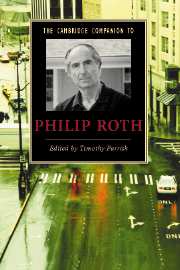Book contents
- Frontmatter
- Introduction: Roth at mid-career
- 1 American-Jewish identity in Roth’s short fiction
- 2 Roth, literary influence, and postmodernism
- 3 Zuckerman Bound: the celebrant of silence
- 4 Roth and the Holocaust
- 5 Roth and Israel
- 6 Roth’s doubles
- 7 Revisiting Roth’s psychoanalysts
- 8 Roth and gender
- 9 Roth and ethnic identity
- 10 Roth’s American Trilogy
- 11 Roth’s autobiographical writings
- Further reading
- Index
6 - Roth’s doubles
Published online by Cambridge University Press: 28 May 2007
- Frontmatter
- Introduction: Roth at mid-career
- 1 American-Jewish identity in Roth’s short fiction
- 2 Roth, literary influence, and postmodernism
- 3 Zuckerman Bound: the celebrant of silence
- 4 Roth and the Holocaust
- 5 Roth and Israel
- 6 Roth’s doubles
- 7 Revisiting Roth’s psychoanalysts
- 8 Roth and gender
- 9 Roth and ethnic identity
- 10 Roth’s American Trilogy
- 11 Roth’s autobiographical writings
- Further reading
- Index
Summary
Writing as deception
The title of Roth's 1990 novel, Deception, is instructively deceptive. Its evident reference is to the erotic deception practiced and endlessly discussed by its protagonists, the writer “Philip” and his unnamed married mistress (among others). Yet the penultimate chapter sees this sense of “deception” overlain by another. Here, Philip's (also unnamed) wife confronts him with the notebook she's discovered, containing the very transcripts of post-coital chatter we've just read. Philip counters her furious charge of deception with the insistence that it's his notebook rather than himself that's deceived her; the affair is fictive, not real, and the Philip of its pages is “far from myself - it's play, it's a game, it is an impersonation of myself!” Philip's defense, in other words, is an appeal to the clear distinction between his real self and its fictive double.
The problem for Philip and his readers, spousal and otherwise, is that once it rears its head, the specter of deception refuses to be contained in this way. Designed to quell suspicion, his insistence on the fictionality of the affair only intensifies it: what if this insistence is part of the same deception? What if, as his wife, no doubt speaking for many readers, charges, “You are caught and you are trying to confuse me!” (Deception, 183) Nor is there any way of resolving this predicament - the affair remains permanently suspended between fiction and reality, such that to read the novel is to be condemned irremediably to deception.
- Type
- Chapter
- Information
- The Cambridge Companion to Philip Roth , pp. 82 - 93Publisher: Cambridge University PressPrint publication year: 2007
- 2
- Cited by



